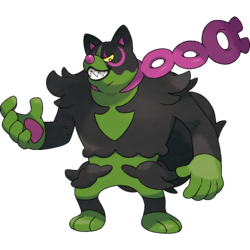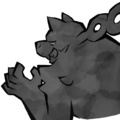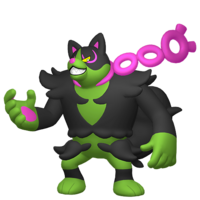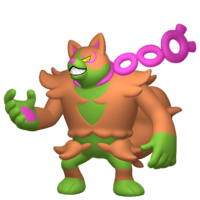From Bulbapedia, the community-driven Pokémon encyclopedia.
|
|
| Line 218: |
Line 218: |
| {{Spindata/GO|col=6|type=Poison|ndex=1014 | | {{Spindata/GO|col=6|type=Poison|ndex=1014 |
| |egg=N/A | | |egg=N/A |
| |buddy= | | |buddy=20 |
| |evolution=N/A | | |evolution=N/A |
| |stamina=204 | | |stamina=204 |
Revision as of 22:17, 14 December 2023
Okidogi (Japanese: イイネイヌ Iineinu) is a dual-type Poison/Fighting Legendary Pokémon introduced in Generation IX, with The Teal Mask.
It is not known to evolve into or from any other Pokémon.
It is associated with Ogerpon. Along with Munkidori and Fezandipiti, it is a member of the Loyal Three.
Biology
Okidogi is a bulky, bipedal canine Pokémon, with broad shoulders, pointy ears, and a large, fluffy tail. Its fur is almost entirely black, except for the green on its muzzle, face, chest, hands, back, waist, thighs, and feet. It has magenta crescent-shaped markings on its face, which also contains yellow eyes, a rounded magenta nose, and sharp teeth. Its ears have magenta insides, and its hands have five fingers each and magenta paw pads. Hanging around its neck is a magenta chain that resembles a leash. Okidogi is a male-only species with no female counterpart.
In Kitakami myth, it is said that Okidogi was once a smaller, weaker Pokémon, but a desire for strength somehow led it to the Toxic Chain around its neck. Okidogi transformed as the chain enhanced its capabilities, granting it a powerful physique by stimulating its muscles heavily. The toxic chain, when thrown, is powerful enough to let Okidogi pulverize anything it hits. It is a ruffian with a short temper, having traveled from a distant land with Munkidori and Fezandipiti to steal Ogerpon's four masks and claim them for themselves, the trio sneaked into Ogerpon's cave and managed to steal three of them while Ogerpon's friend managed to protect one of them. After finding out, Ogerpon finds out about what happened and beats the trio up, Okidogi loses its life in the fight along with its partners. In the villagers' eyes though, it looked like the trio had fallen protecting the village from the enraged ogre, nicknaming them the Loyal Three and giving them a proper burial.
Okidogi, together with Munkidori and Fezandipiti, are known as the Loyal Three, the heroes of Kitakami. They are beloved by the people of Kitakami as heroes that once protected the land from the "evil ogre",[1] and stone statues bearing their likenesses were made by the people as an expression of their gratitude right where the three had been buried.[2] According to locals, worshiping Okidogi will grant kindness and help ensure things are 'okey-dokey' between both sides. Even with its greedy and mean personality, Okidogi has good relationships with its teammates, talking to them in private and acting together to defeat their opponents. By consuming the Kitakami Mochis, Okidogi can become a Titan Pokémon.
The Loyalty Plaza after being rebuilt.png
As seen on the signs around Kitakami
Game data
Pokédex entries
| This Pokémon was unavailable prior to Generation IX.
|
| Generation IX
|
|
Paldea
#—
|
|
Kitakami
#197
|
| Scarlet
|
After all its muscles were stimulated by the toxic chain around its neck, Okidogi transformed and gained a powerful physique.
|
| Violet
|
Okidogi is a ruffian with a short temper. It can pulverize anything by swinging around the chain on its neck.
|
|
|
Game locations
| This Pokémon was unavailable prior to Generation IX.
|
|
|
In side games
Held items
Stats
Base stats
| Stat
|
Range
|
| At Lv. 50
|
At Lv. 100
|
88
|
|
148 - 195
|
286 - 380
|
128
|
|
119 - 198
|
234 - 390
|
115
|
|
108 - 183
|
211 - 361
|
58
|
|
56 - 121
|
108 - 236
|
86
|
|
81 - 151
|
159 - 298
|
80
|
|
76 - 145
|
148 - 284
|
Total: 555
|
Other Pokémon with this total
|
- Minimum stats are calculated with 0 EVs, IVs of 0, and (if applicable) a hindering nature.
- Maximum stats are calculated with 252 EVs, IVs of 31, and (if applicable) a helpful nature.
|
Type effectiveness
| Under normal battle conditions in Generation IX, this Pokémon is:
|
|
|
|
|
|
|
|
|
|
|
|
|
Learnset
|
|
|
|
- Bold indicates a move that gets STAB when used by Okidogi
- Italic indicates a move that gets STAB only when used by an Evolution of Okidogi
|
|
|
|
|
- Bold indicates a move that gets STAB when used by Okidogi
- Italic indicates a move that gets STAB only when used by an Evolution or an alternate form of Okidogi
|
|
|
|
|
- Moves marked with an asterisk (*) must be chain bred onto Okidogi
- Bold indicates a move that gets STAB when used by Okidogi
- Italic indicates a move that gets STAB only when used by an Evolution of Okidogi
|
Side game data
Pokémon GO
| File:GO1014.png
|
Base HP: 204
|
Base Attack: 240
|
Base Defense: 210
|
| Egg Distance: N/A km
|
Buddy Distance: 20 km
|
Evolution Requirement: N/A
|
| Fast Attacks:
|
| Charged Attacks:
|
|
|
Evolution data
Sprites
| This Pokémon was unavailable prior to Generation IX.
|
|
|
|
|
Trivia
Origin
Okidogi seems to be based on a dog, specifically the Shiba Inu or the Japanese Akita, as it shares a bulkier appearance with the latter. The similarity is further pronounced with its Shiny form and the association of the Land of Kitakami and the Tōhoku region (Northeast Japan) where Akita Prefecture is located. The chain on its neck resembles a dog leash.
Okidogi, together with Munkidori, Fezandipiti, and Ogerpon, may reference the Japanese folktale of Momotarō. The tale relates the titular Momotarō, a boy born from inside a peach, who traveled alongside a talking dog, monkey, and pheasant to fight a band of oni (a Japanese folkloric creature commonly equated to ogres in translations). The purple chain could be based on a shimenawa.
Name origin
Okidogi may be a combination of okie-dokie (variant of "okay") and dog.
Iineinu may be a combination of いいね ii ne (interjection to express approval) and 犬 inu (dog).
In other languages
| Language
|
Title
|
Meaning
|
 Japanese Japanese
|
イイネイヌ Iineinu
|
From いいね ii ne and 犬 inu
|
 French French
|
Félicanis
|
From félicité and canis
|
 Spanish Spanish
|
Okidogi
|
Same as English name
|
 German German
|
Boninu
|
From bon and 犬 inu
|
 Italian Italian
|
Okidogi
|
Same as English name
|
 Korean Korean
|
조타구 Jotagu
|
From 좋다고 jotago and 구 (狗) gu
|
 Mandarin Chinese Mandarin Chinese
|
夠讚狗 / 够赞狗 Gòuzàngǒu
|
From 夠 / 够 gòu, 讚 / 赞 zàn and 狗 gǒu
|
 Cantonese Chinese Cantonese Chinese
|
夠讚狗 Gaujaangáu
|
From 夠 gau, 讚 jaan and 狗 gáu
|
|
|
|
|
|
|
|
Related articles
References
External links

|
This Pokémon article is part of Project Pokédex, a Bulbapedia project that aims to write comprehensive articles on each Pokémon species, as well as Pokémon groups and forms.
|

 For other sprites and images, please see Okidogi images on the Bulbagarden Archives.
For other sprites and images, please see Okidogi images on the Bulbagarden Archives.







